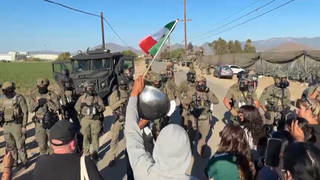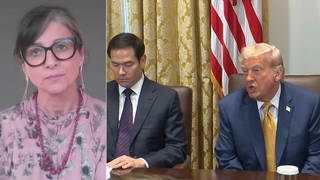
Guests
- Jeremy ScahillDemocracy Now! correspondent in Belgrade.
France’s foreign minister arrived in Belgrade this morning to reiterate Western support for new Yugoslav President Vojislav Kostunica. A day after the EU lifted the economic sanctions and offered Yugoslavia $2 billion in aid to help rebuild the country, French Foreign Minister Hubert Védrine invited Kostunica to a European Union summit meeting. This comes as Democratic Opposition of Serbia sources signaled the new leadership’s interest in similarly restoring ties with the United States.
Transcript
AMY GOODMAN: The new government in Yugoslavia is reaching out to the West. France’s foreign minister is in Belgrade today to invite the new Yugoslav president to a European Union summit meeting. This comes just a day after the union lifted economic sanctions and offered Yugoslavia $2 billion in aid to help rebuild the country.
Meanwhile, a key Kostunica ally signaled interest in restoring ties with the United States. The opposition had shunned the U.S. during last month’s election campaign because of public hostility over the NATO bombing campaign, but now opposition leaders say ties with America are crucial.
We turn now to Belgrade with Democracy Now! correspondent Jeremy Scahill.
Jeremy, let’s start off with the latest news of, well, what appears to be elections scheduled for December 17th for the Serbian parliament.
JEREMY SCAHILL: Well, there are very conflicting reports and portrayals of what exactly happened in Belgrade yesterday. But what is clear is that two key allies of Slobodan Milosevic have definitely resigned. The first is Vlajko Stojiljkovic, who was the minister of the interior. He was the head of the notorious police force that was built up by Slobodan Milosevic over the course of the last decade. He apparently now is out. The Prime Minister of the Federal Republic of Yugoslavia Momir Bulatovic, who is from Montenegro, he also resigned.
Democratic Opposition of Serbia, as they are still known, apparently obtained an agreement from the president of Serbia, the Republic of Serbia, Milan Milutinovic, to step down and dissolve the Serbian parliament. Spokespeople from DOS said yesterday that they are now forming a transitional government of experts on the republican level. This is important for them because they did not win elections on the Serbian level, they won them on the federal level. And many institutions on the republican level are still controlled by allies of Slobodan Milosevic. This is a move by the new government of Kostunica to try to consolidate a power base that technically they don’t have a right to consolidate.
At yesterday’s session of the Serbian parliament, there was a very heated debate. Vojislav Seselj, who was the head of the right-wing, ultranationalist Serbian Radical Party and a part-time ally of Slobodan Milosevic, said that his party had broken ranks with Milosevic in recognizing the victory of Vojislav Kostunica. But interestingly, Seselj said that everything that has happened since they did that, by the Democratic Opposition of Serbia, has been reminiscent of like a coup. And Vojislav Seselj said he was not going to participate in a coup. What he’s referring to is that the government of Vojislav Kostunica has been strong-arming Serbian institutions, such as the police force and the customs agency, taking them over at times by force. Zoran Dindic, who many feel is the power behind Vojislav Kostunica, he’s the head of the Democratic Party, someone who traveled abroad during the bombing, met with Madeleine Albright, apparently went into the federal customs agency and, by force, essentially procured the resignation of the top customs official in the country. There are reports that this also happened at police precincts within Yugoslavia.
So it appears as though the new federal government of Vojisalv Kostunica is really trying to crack down on the government of the Republic of Serbia, which legally they don’t actually have a right to do. So it appears as though the republican government has either been threatened or strong-armed into stepping down and calling for new elections December 17th. The Democratic Opposition of Serbia is viewed widely to be able to win those elections and to have a member of the opposition become the new president of the Serbian Republic. So, really, what we’re seeing is a consolidation of power, sometimes overreaching the law.
AMY GOODMAN: And what about Kosovo? Yesterday, you talked about Kostunica’s view that Kosovo should remain a part of Yugoslavia.
JEREMY SCAHILL: Well, ethnic Albanian leaders in Kosovo are furious right now that Vojislav Kostunica is the president of Yugoslavia. They say that he’s exactly like Milosevic to them. What’s interesting is that Slobodan Milosevic provided an alibi not only to Kosovo Albanians, but to the United States, to maintain a policy of what has essentially been terror in Kosovo. More than 150,000 Serbs have been expelled from Kosovo in the year since NATO troops began their occupation. The place is an utter hell for ethnic minorities. And Kosovo Albanians have been able to use the government of Slobodan Milosevic to justify the massive aid that they’re getting from the West and also to justify the military attacks that they’re doing into eastern Serbia, parts of Yugoslavia that are not even recognized as Kosovo. Yesterday and today both, there were attacks into Serbia, invasions by former members of the Kosovo Liberation Army. Vojislav Kostunica is facing somewhat of a political crisis right now because he’s going to have to respond, probably militarily, to attacks on the sovereignty of Yugoslavia. He has not done that yet.
AMY GOODMAN: We’re talking to Jeremy Scahill in Belgrade, Democracy Now! correspondent. Now, what did you say? You think that he will be responding militarily? You think that’s a possibility with the amount of money that he’s being offered by Europe and, probably very soon, the United States?
JEREMY SCAHILL: What I’m saying is that I think that Vojislav Kostunica is going to face a massive credibility problem here in Yugoslavia if he does not address the fact that the border of Kosovo, which is still a province of Serbia, is being expanded by the fact that members of the Kosovo Liberation Army, former members, are invading Serbia proper, parts of Serbia that are not even recognized as being Kosovo. They are directly challenging the presidency of Vojislav Kostunica because they say he’s a nationalist and that they’re going to continue with their actions. If Vojislav Kostunica does not raise the issue of Kosovo, he’s going to have significant portions of the Serbian public turn on him and demand that he do something.
AMY GOODMAN: But given the level of support that the KLA has gotten from the West, don’t you think they’ll back off now that someone else that they support, Kostunica, is in power?
JEREMY SCAHILL: Absolutely not. I think that the Kosovo Liberation Army are not people that are going to be easily reined in by the United States, despite the fact that the U.S. has been aiding them in carrying out their agenda. They very much are nervous about the fact that the West is now getting very friendly with Vojislav Kostunica, because they see it as their feeding trough being reduced, because a lot of aid is going to start coming into Serbia. And quite frankly, it’s easier for Vojislav Kostunica to negotiate a more favorable position with Kosova from the perspective of Serbs than it would have been for Milosevic, because of The Hague indictment and because of the vilification by the Western media and Western governments. Vojislav Kostunica is actually going to be in a much stronger position to call into question the way in which the United States and other Western European countries have really created this state of terror within Kosovo.
I should point out that an interesting thing that’s been developing here in Yugoslavia is that the media, which is often referred to under the regime of Slobodan Milosevic as state-run and a propaganda media, has almost taken a 180-degree shift and has become a propaganda organ for the government of Vojislav Kostunica. There is almost no critical reporting whatsoever of his government. The issues of the IMF and the World Bank coming in here are not being raised. The head of the stability pact for Europe is coming to Yugoslavia tomorrow. There are no critical articles about neoliberalism, about the IMF/World Bank funding. It’s all very positive press coverage for Vojislav Kostunica and the new government. And I think that what we’re seeing right now is Vojislav Kostunica consolidating not only federal and Serbian institutions, but also the media, as well.
AMY GOODMAN: Jeremy Scahill, I want to thank you for being with us, as we get our regular reports from you from Belgrade, Yugoslavia. Jeremy Scahill, Democracy Now! correspondent.













Media Options